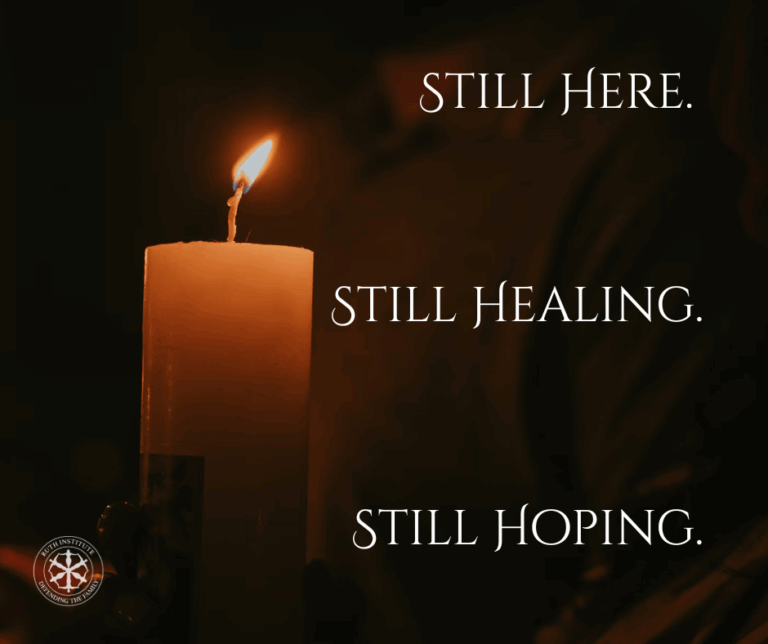By Tyler O’Neil
This article was first published September 7, 2017 at pjmedia.
In 2013, the Southern Poverty Law Center (SPLC) branded the Ruth Institute (RI) a “hate group,” and has stood by this decision ever since.
Last month, the credit card processing company Vanco Payments canceled its partnership with RI seemingly over this issue.
Also last month, the SPLC reiterated its attack on RI, claiming to quote RI Founder and President Jennifer Roback Morse. In actuality,
the quote they presented to justify labeling Morse a “hater” came from another source — the Catechism of the Catholic Church.
Since the SPLC applied the “hate group” label to RI, “I don’t see why they wouldn’t also have to say that the Catholic Church is a hate group,”
Chris Gacek, senior fellow for regulatory policy at the Family Research Council (FRC),
told PJ Media in an interview. “Except that it would be totally suicidal at this time.”
“Absolutely, I think that’s right,” Roback Morse herself told PJ Media in another interview. But she argued that the reason the SPLC will not
brand the largest Christian denomination a “hate group” has nothing to do with them being “afraid of the Catholic Church.”
While Roback Morse admitted she does not know the SPLC’s motivation, she explained, “The fact is, inside the Catholic Church, there are many shall
we say gay allies. There are people inside the Church who are trying to change the Church’s teaching.”
“If I were the SPLC, attacking the Catholic Church would not be smart right now,” the RI president added. “Better to let the Catholic Church unravel
itself from the interior. But for all I know, at some point they may go after the Catholic Church and label it a hate group.”
Indeed, Gacek’s reasoning is sound. In its August update on
the activities of “Anti-LGBT Hate Groups,” the SPLC justified listing RI in this manner. “Over the years, Roback Morse has claimed that the
gay rights movement is ‘anti-human’ and has used Catholic doctrine to assert that LGBT people are ‘intrinsically disordered’ and that they
should remain celibate (or leave the ‘gay lifestyle’) and not act on their attractions.”
Here is the section on homosexuality from the Catechism of the Catholic Church,
the authoritative statement of doctrine which Catholics must agree with:
Homosexuality refers to relations between men or between women who experience an exclusive or predominant sexual attraction toward persons
of the same sex. It has taken a great variety of forms through the centuries and in different cultures. Its psychological genesis remains
largely unexplained. Basing itself on Sacred Scripture, which presents homosexual acts as acts of grave depravity, tradition has always
declared that “homosexual acts are intrinsically disordered.” They are contrary to the natural law. They close the sexual act to the gift
of life. They do not proceed from a genuine affective and sexual complementarity. Under no circumstances can they be approved.
This is the official position of the largest Christian denomination, and if its position justifies calling the Ruth Institute a “hate group,”
then the SPLC should be consistent and label the Roman Catholic Church a “hate group.”
Furthermore, Pope Francis — often a darling of the political Left — has outspokenly condemned LGBT ideology, calling transgenderism
in particular “a global war against the family.”
Why are his remarks not listed on the “Anti-LGBT Hate Group” page?
In her interview with PJ Media, Roback Morse explained the reasons she opposes the LGBT movement. “The reason that I battle the sexual revolution
the way that I do is that I believe it has been harmful particularly to children,” the RI president said.
“If you start with the idea that children are entitled to a relationship with both of their parents, you’ll end up with traditional Catholic
morality,” she argued. “You’ll end up with, ‘Don’t have sex until you’re married, and don’t have sex with anybody you’re not married to,
and contraception and abortion do not get you off the hook.'”
But contemporary secular culture has “thrown all that under the bus for the sake of adult sexual freedom. Whether you’re gay or not gay
— that’s not what we’re concerned about.” Roback Morse argued that the worst aspect of the LGBT agenda is that it “furthermore
undermines the social and legal perception that kids are entitled to a relationship with their parents.”
Chillingly, she declared, “I think that adults should be sacrificing for their children, not the other way around.”
The RI president also explained why the Catholic Church is the natural enemy of the LGBT movement. “The Catholic Church, at least on paper,
is the last big organization taking a stand against the sexual revolution and in favor of traditional morality,” she said. “Now, in
practice that’s not always true because there are priests and bishops who are all over the map, but the Catechism is still very clear
on these points.”
“If you’re a group like the SPLC or any other sexual revolutionary group like Planned Parenthood, they can correctly recognize that the
Catholic Church is their enemy,” Roback Morse concluded.
The SPLC’s “hate group” list has gained traction following the white supremacist riot in Charlottesville, Va. The SPLC originally made
its name fighting groups like the KKK in court, but later transitioned to labeling mainstream conservative and Christian organizations
“hate groups” along with the KKK. An SPLC spokesman declared that
his organization’s “aim in life is to destroy these groups, completely.”
In recent months, the mainstream media and Internet companies have aided in those efforts. CNN recently broadcast the SPLC’s “hate map”on
its website and Twitter account (which still includes FRC, by the way), and two other major media outlets, ABC and NBC, parroted the SPLC’s “hate group” label against Alliance Defending Freedom (ADF) last month.
Google officially announced that
it was partnering with the SPLC and ProPublica to launch the Documenting Hate News Index. Similarly, Apple CEO Tim Cook announced that his company would give the SPLC $1 million, that it would match employee contributions, and that it would set up
a system in iTunes software for consumers to donate directly.
In June, the charity navigation website GuideStar adopted the SPLC “hate group” list,
marking each profile of the targeted organizations as a “hate group.” This action inspired the first of three lawsuits against
the SPLC, launched by the Christian nonprofit Liberty Counsel.
In December, D. James Kennedy Ministries was denied access to Amazon’s charity connection service, Amazon Smile, because it was listed as a “hate group” by the SPLC. They
also filed a lawsuit against the SPLC for defamation.
The list of “hate groups” is extremely problematic, partially because the reasons the SPLC gives for defaming them shift frequently.
The SPLC briefly listed Ben Carson as an “extremist” on its list, and only took his name down following a public outcry. Just last
week, the group removed the innocent historic town of Amana Colonies from its “hate map.” Furthermore, the group seemed unable to decide why Muslim Maajid Nawaz was guilty of “anti-Muslim extremism.”
It listed and removed many different reasons, one of which was Nawaz’s visit to a strip club for his bachelor party.
The group also recently released a map of all Confederate monuments across America, which just happened to include elementary schools, middle schools, and high schools.
The SPLC’s post publishing the map also warned of “turmoil and bloodshed” if Confederate monuments were not removed.
This map is especially troublesome, considering the SPLC’s history of inspiring terror. This past month marked the fifth anniversary
of a terrorist attack against the Family Research Center by Floyd Lee Corkins II.
Corkins broke into the FRC, planning to kill everyone in the building, and intending to carry his attacks elsewhere as well. He
pled guilty to committing an act of terrorism and was sentenced to 25 years in prison.
During an FBI interrogation, he said he targeted the FRC because of the SPLC “hate map.”
The SPLC has also been connected to Bernie Sanders supporter James Hodgkinson, the man who shot Rep. Steve Scalise (R-La.) this
summer. Hodgkinson “liked” the SPLC on Facebook,
and the SPLC had repeatedly attacked
Scalise — even after he apologized and distanced himself from the remarks that earned him a spot on the SPLC “extremist” list.
The SPLC also has a huge endowment ($328 million as of 2015), and The Washington Free Beacon recently reported that the group has sent multiple transactions to foreign entities, including two cash payments of $2.2 million to the Cayman
Islands.
Why Google, Apple, GuideStar, and Amazon take the SPLC’s “hate list” seriously is anyone’s guess. James Damore, the former senior
software engineer who wrote a memo attacking Google for fostering an “intellectual echo chamber,” was likely on to something.
In her remarks to PJ Media, Jennifer Roback Morse noted that “the Left believes they are correct on the substance of the issues,”
but also denounced the hypocrisy.
Ironically, the RI president defended Vanco Payments’ decision to stop doing business with her, even though it was inspired by
the discredited SPLC “hate group” list. “They can do business with anybody they want, for any reason they want,” Roback Morse
said. “But I wish that florists and cake bakers and photographers were accorded the same privilege.”
Many Christian bakers, photographers, and florists have been penalized by the government for refusing to serve at same-sex weddings.
Roback Morse defended their free speech, religious freedom, and free association rights to opt out of such business, so she
also defended Vanco’s right to do the same with the Ruth Institute.
Would that the Southern Poverty Law Center followed such consistency.



